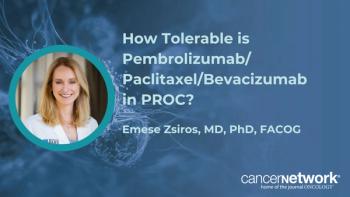
Oncology NEWS International
- Oncology NEWS International Vol 15 No 7
- Volume 15
- Issue 7
Dr. Niederhuber, New Acting Director of NCI, Confronts the Old Problem of an Ever-Declining Institute Budget
Department of Health and Human Services Secretary Michael Leavitt has appointed John Niederhuber, MD, as the National Cancer Institute's acting director after Andrew C. von Eschenbach, MD, resigned the post he had held for 4.5 years.
BETHESDA, MarylandDepartment of Health and Human Services Secretary Michael Leavitt has appointed John Niederhuber, MD, as the National Cancer Institute's acting director after Andrew C. von Eschenbach, MD, resigned the post he had held for 4.5 years.
Dr. Niederhuber, a surgical oncologist and former head of the University of Wisconsin Comprehensive Cancer Center, had served as NCI's chief operating officer since President Bush named Dr. von Eschenbach as acting commissioner of the FDA late last summer. In March, Mr. Bush nominated Dr. von Eschenbach as FDA commissioner. He will continue to serve as acting FDA commissioner pending his confirmation and as a senior advisor to Secretary Leavitt. Dr. Niederhuber, who joined NCI in September 2005 as deputy director of translational and clinical sciences, will lead the Institute until a new director is named.
Although he has a new title, Dr. Niederhuber must still confront the same major problem he has wrestled with since last fallfinding funds to support the Institute's growing research needs at a time of ever-shrinking budgets. The latest assault on the pool of money available to NCI: an unexpected $4 million surcharge levied to cover the rising cost of electricity and other resources needed to run the agency's offices and laboratories.
Since Congress completed the "doubling" of NCI's budget in 2003, which actually increased its appropriations by 80% over 5 years, the agency has received less in actual dollars available to it in each successive year. "You've agonized with us over the flat budgets," Dr. Niederhuber said at a meeting of the National Cancer Advisory Board. He warned that the outlook for fiscal year (FY) 2007 looks equally bleak.
In directing NCI's day-to-day operations, Dr. Niederhuber has experienced the frustrations of trying to maintain the Institute's extramural and intramural research priorities with the shrinking dollars available. "When the budget is flat, it is really a deficit budget because of inflation and what we call the chip-away of our budget," he said. These chip-aways include such things as payments to the National Institutes of Health for research projects that involve two or more institutes and/or centers.
The President's NCI budget request for FY 2007 of $4.8 billion was essentially the same amount as Congress appropriated for FY2006. On June 13, the House Appropriations Committee approved a budget bill that contained almost the exact dollar amount as the President requested and forwarded it to the full House for a vote. "There are some very fine differences but actually, with rounding, they do not even show up," said Susan Erickson, director, NCI's Office of Policy Analysis and Response.
Dr. Niederhuber expressed his personal belief that the FY 2007 budget, as was the case with the current budget, would not be enacted on October 1, the beginning of the federal government's fiscal year. "My anticipation is that we will go on a continuation budget, like we've had in years past, and it will probably be in January or so before a budget is in place," he said.
Nor did he foresee relief in the next few years for NCI's dwindling funds. "The reality is that we are not going to get a huge amount of new money from the federal government into the NIH or NCI budgets," he said.
Articles in this issue
over 19 years ago
High-Quality Screening Colonoscopy Priority for GI Docsover 19 years ago
Genentech Seeks Expanded Use of Avastin in Breast Cancerover 19 years ago
Denosumab Suppresses Bone Resorption in Breast Ca Metsover 19 years ago
FDA Approves Priority Review of Merck's Zolinza (Vorinostat)over 19 years ago
FDA Approves Revlimid for Myeloma Rxover 19 years ago
Real-Time RT Planning, Delivery in the Bronxover 19 years ago
Phase III Trial of Enzastaurin for NHL Patients Initiatedover 19 years ago
Racial Disparities in Prostate Ca Recurrenceover 19 years ago
HNPCC Pts May Reject Prophylactic Subtotal ColectomyNewsletter
Stay up to date on recent advances in the multidisciplinary approach to cancer.










































